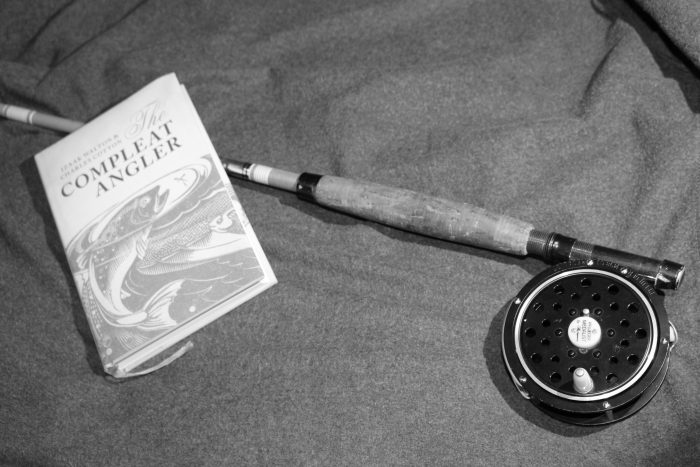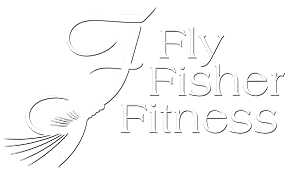Tips For Aging Anglers
 Tips For Aging Anglers
Tips For Aging Anglers
We all get older. It’s the long-term quality of life as we age that dictates our experience. Better quality of life with age means the ability to what we love regardless of age. In our case it’s fly fishing with vigor for longer.
Purpose:
If your line is not in the water, you have zero chance of catching fish. That is why proactive fitness is our priority. We work to get at the root causes of age-related decline, before they occur if possible. Prevention is the ideal. Of course, our work is science-based, biology-based to be specific. We recognize symptoms, things like pain and stiffness, reduced balance, susceptibility to cold, as indicators of aging.
Reduced balance is a symptom. Rather than treat symptoms, we focus our efforts on improving the biological processes that cause symptoms. Trying to improve balance, for example, without addressing its source is futile.
Begin with a foundation. Build the two underpinning integral functions, the straight line to strength, coordination and longevity—high V02 max and the composite strength and muscle mass. From a foundation of strength, ample muscle and endurance, building the finer skills of balance and coordination will come easily.
Improved endurance and thermoregulation will come of their own accord. You will wade longer, fish harder, and longer with improved endurance and thermoregulation. Fit fly fishers are out fishing more often and, for longer periods, catching more fish.
Strength, muscle mass, coordination, balance, endurance and stamina are products of a lot of work. It requires serious effort. Spinning your wheels by treating symptoms is the last thing you want to do.
We Know With Absolute Certainty We Can Influence the Aging Process
You can fly fish with vigor regardless of age. Accept nothing less!!!
My friend Skip was sitting on his tailgate. He was struggling with his waders, when a passer-by fly fisher said, “that’s just part of getting older.” That thought is ‘old school.’ We know better now. There is just too much (overwhelming) clinical evidence highlighting the power we have over the aging process.
Tips for Aging Anglers Number One:
First, get your head right. Don’t think like an old person (old school). Remember the seemingly banal platitude: ‘The mind is a wonderful servant, but a terrible master.’ The essence of this message is anything but a dull bromide. We humans live with incessant mind chatter. And the noise around aging—stories, emotion, jokes and opinions—are manifestations of the mind’s propensity for chatter and fish stories. No matter what society, friends and neighbors say, Nature runs the program. Research has demonstrated this fact, how you think about aging influences how you age.
Heighten your awareness. Rethink what you ‘know.’ Educate yourself about what it means to age and the power you have over your own biology. Knowing the facts is the beginning, the light of awareness. It equips you to take over the controls, directing your mind to follow as a good servant.
The fact is, biological aging differs from chronological aging. Chronological aging is static. You grow older by one, every year on your birthday. Biological aging is dynamic, cellular. It can change; progress and speed up or slow and reverse at any point based on inputs from you; think…lifestyle!!!
Tips for Aging Anglers Number Two:
When I talk with fly fishers at The Fly Fishing Show, club meetings, etc…..they are curious what is going on in their body.
- “I have changed nothing in my eating and I am getting rounder, softer, doughier—it’s as though my body is out of control. What can I do?”
- “I never had joint pains before. Why am I so stiff? It’s hard to put my socks on, and waders. Hell, I’m out of breath when I finally get those things on!”
- Is shoulder, wrist, hand surgery the only option?
- “Why is it I can’t tolerate the cold as well as I used to?”
Answer: these are red flags, warnings, shots across the bow. The Universe is communicating these warnings. Your body is changing. You are getting biologically older! You cannot continue to ‘maverick’ your way through life. If you want your body to run well as you age, you have to update your lifestyle to match the biological changes. Pay attention, reset the stage, change your habits. Again, awareness is essential to aging well!!!
One of the most consequential effects of age is the involuntary loss of muscle mass and strength. Muscle mass decreases approximately 3–8% per decade after the age of 30 and this rate of decline increases after the age of 60 to about 13% per decade.
This involuntary loss of muscle mass and strength is a fundamental cause of and contributor to chronic pain, stiffness, loss of function, disability and the subsequent inactivity in older people.
A 2010 report in the journal Clinical Nutrition and Metabolic Care, noted, ” a decrease in muscle mass is also accompanied by a progressive increase in fat mass and consequently changes in body composition, and is associated with an increased incidence of insulin resistance in the elderly. Furthermore, bone density decreases, joint stiffness increases, and there is a small reduction in stature (kyphosis). All these changes have probable implications for several conditions, including type 2 diabetes, obesity, heart disease, and osteoporosis.”
The word consequential is paramount. When you lose muscle, other areas decline as a result. For example, the quality and quantity of mitochondria decline. Mitochondria are tiny powerhouse organelles within your cells. They create the energy that burns calories. For scale, visualize one mitochondrion is 0.5 micrometers. A grain of salt is 500 micrometers. This is the scale of initial decline. It is hard to notice and easy to push aside. As aging plows on, unnoticed, it expands. Fewer mitochondrion is why you have less energy than those youngsters who seem to have unlimited energy.
Life requires muscle!!! The more muscle you have, the less pain and stiffness you endure. A decline in muscle also means less calorie burning and therefore, more calories stored as fat, thus, the change in body composition. Reduction in calorie burning also leads to reduced thermoregulation, difficulty staying warm.
Joint, back, and overall stiffness are more of the cascading effects of muscle loss. You can find a deeper explanation in this post.
Tips for Aging Anglers Number Three:
If you went to a doctor for all the age-related decline, you could get a synthetic medicine for each issue. But the side effects would be worse than the condition!
You are in control. And it doesn’t take knowing everything in granular detail to improve your condition. Once you understand the basics, you’ll grasp the need to take your adult life in a new, more productive direction.
You can intervene, subvert and override the default biological messages to decline with your own messages in the way of lifestyle changes.
The body has innate healing mechanisms just waiting to kick in. We provide the conditions to activate survival processes called hormesis. Small doses of adversity, good stress, that signal the body to protect itself by kicking in growth pathways. Some researchers call them survival networks or longevity pathways…One could call them vitality networks.
It’s the idea that ‘what doesn’t kill you makes you stronger.’ It is the body’s natural survival mechanism that turns on growth, repair, and healing processes.
Tips for Aging Anglers Number Four:
- *Update your lifestyle choices by exercising and eating less. The human body has an exquisite, built-in intelligence to constantly, moment-by-moment sense its environment. It picks up on the good stress of exercise and triggers growth hormones, healing pathways and turns on vitality genes. Muscle is a miraculous tissue, organ and even acts as an endocrine organ. Humans have an average of 75-100 pounds of muscle at our disposal. That’s the power you have to manipulate your biology in your favor!!!
- *Most people don’t know it or overlook it, but our body is incredibly sensitive to what we eat. Your nutrient sensing systems continuously look for instruction what hormone, coenzyme or pathway to turn on based on what you eat.
- *Along those same lines, your body is paying attention when you are not eating, and it kicks in an ancient survival mechanism called autophagy.
During fasting, a form of hormesis kicks in to reduce inflammation by cleaning up and recycling zombie (and other) cells (damaged senescent cells) through the process of autophagy (self-eating). You don’t have to starve yourself, just eat a little less. Wait an extra hour before breakfast or stretch out the time between breakfast and lunch. Or skip lunch.
Research suggests that the autophagy process is not on/off, but more like a dimmer.
Tips for Aging Anglers Number Five:
Cultivate a healthy and diverse microbiome. The father of medicine, Hippocrates (460-375 B.C.). said, “All disease begins in the gut.” We now know, 70% of immune function occurs in the gut. Trillions of microbes, 10 times more than your human cells, about 100 trillion microbes, call your body home and good, diverse microbiome in your gut fights disease, promotes optimal health and promotes longevity.
A diet of whole, diverse foods ensures beneficial microbes flourish. A diverse microbiome compliment aids digestion, turns good foods into useful nutrients, reduces inflammation, and protects against disease. Bonus: the more whole foods you eat, the more calories your microbiome absorbs and the fewer you absorb!!!
Researchers are still learning how sleep, medications, stress and exercise affect gut microbiome. But we know the most significant factor determining the health of your microbiome is diet.
Eat a healthy diet, exercise; and compliment that with the ingredients for health while removing the impediments to health. You will change the internal environment in which aging, decline, and disease live at its root cause.
Conclusion:
Over many years of trial and error, bloodwork analysis, disease, cancer monitoring and, most important, boots-on-the-ground experience, I have developed a ‘training lifestyle.’
It is not extensive, five things.
- Resistance work–go to the gym. Workout at home. Do daily aerobics and stay active in other ways, flyfishing we hope. The idea is your workouts need to be part of an active life. Don’t go to the gym, then sit the rest of your existence. You could say exercise and movement!!!
- Eat a healthy plant-based diet. Avoid sugar. Eat whole foods. Don’t follow the standard American Diet (SAD). Make plant-based choices. That means more plants, not all plant. Plant phytochemicals enhance and trigger hormetic and nutrient pathways. Food is medicine!!!
- Eat less. The benefits of reducing calorie intake are one of the most well-documented actions for longevity.
- Cultivate a diverse microbiome. Prebiotics, probiotics, berries, fruit, fiber—both soluble and insoluble, eating diverse foods will support healthy, disease fighting microbiome.
- Develop a mindset of health, vigor and longevity. Connect and engage with others. Support your physical vigor with emotional health!!!
Are you interested in joining a community of like-minded fly fishers and outdoor types who want to engage and discuss The Art of Aging?
Learn more…..Join us on Substack!
Note: The information herein is meant to be general guidance on fitness. It is not a substitute for consultations with healthcare professionals. In fact, professional consultations are required for success with exercise. Always have a physician approve your planned activity before making changes.
Categorized in: General Knowledge
